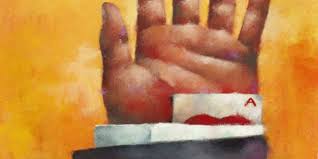
The Search for Truth is the Search for God
Imagine a world in which nobody lies. Now imagine a world in which lying is illegal and enforced by law enforcement officers who “speculate” about who is lying and who isn’t.
That’s the idea behind a futuristic novel by Ben Winters called “Golden State,” evoking that far-western state whose license plates bear this name. I haven’t read the book itself, only a review of it by Lynn Neary on National Public Radio’s web site. But I found the idea fascinating, and repulsive.
Although this idea is a setting for a crime story, it provides insight into the quest for truth.
“There is a constant collective effort in the Golden State to reinforce the truth in small ways and large,” Winters says. “It is a place that is not only dedicated to the preservation of reality — it is worshipful of the truth.”
Just Different Enough
In creating the Golden State, writes Neary, Winters says he wanted to build a world just different enough that readers would have to look at our own reality in a new way.
It may be no surprise that the author was influenced in his writing by the current state of affairs – political and social. With the exception of the fascist and other repressive regimes in Europe and other parts of the world, I can’t recall a period when the truth was less respected, when the lie was more accepted as the norm.
What does this have to do with the search for God?
It’s that the search for God is the search for truth, and contempt for truth makes the search impossible.
Part of the problem is that for some people, “truth” itself is fictitious. For them, we each have our own truth. What’s true for you isn’t true for me.
I think, however, that the vast majority of people still believe there is such a thing as objective truth. It’s just that its value has taken a big hit. Many believe that if a lie achieves its goals – political or otherwise – it’s OK. The end justifies the means.
Respect for the Truth
The search for God, on the other hand, requires respect for the truth – even when the truth doesn’t appear to support our ideas and beliefs. For believers, that sometimes appears to be the case regarding science, whose criteria for “truth” differs from that of faith.
But our God is the God of science, who gave us brains that he/she presumably expects us to use to figure out how science aligns with faith.
Jesus’ words in the Gospel of John apply, I believe, to those seeking God in whatever form. “If you continue in my word, you are truly my disciples, and you will know the truth, and the truth will make you free.”
The truth is a two-edged sword, however. It can, and should, produce doubt as well as faith. Regardless, the truth should be pursued vigorously in the search for God. We should ask ourselves if we sufficiently counterbalance arguments and cultural norms that challenge the value of faith by reading, viewing and listening to what encourages it.
But searching for the truth is only part of the way in which we search for God, or helping God search for us. Although doctrine matters, faith is not primarily a matter of what we believe but who we believe. It’s primarily about our relationship with God and others.
A Lawyer Asks
In Mathew’s gospel, when a lawyer asks Jesus to name the greatest commandment in Jewish law, Jesus quotes parts of the Hebrew Bible. “You shall love the Lord your God with all your heart, and with all your soul, and with all your mind. And a second is like it, you shall love your neighbor as yourself. On these two commandments depend all the law and the prophets.”
So how do we establish, or improve, our relationship with God? Prayer is the principal way. Attending church services is another. Reading and viewing material that helps us believe and love God and neighbor is another.
But the way that is probably least acknowledged is going out of our way for others – especially God’s poor and marginalized. Volunteer to do something for someone else, and be kind, compassionate and caring. In other words, fulfill the greatest commandment by fulfilling the second.



